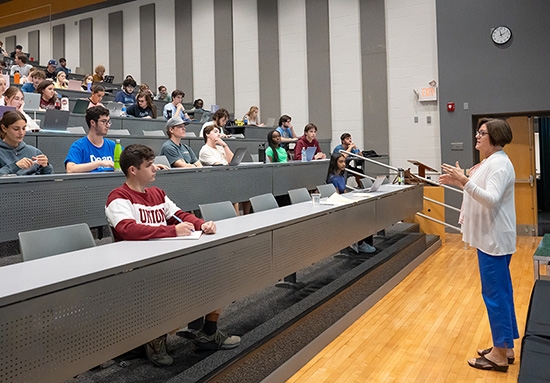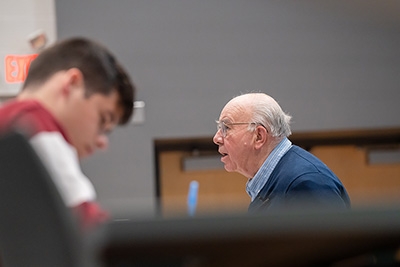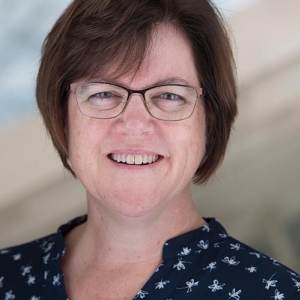In just under 50 days, Ben Raphael ’27 will vote in his first presidential election.
The shortest presidential election in modern American history, the race has already featured a series of extraordinary events: a devastating debate performance by the incumbent, President Joe Biden, that ultimately led to him dropping out and being replaced by his vice president, Kamala Harris; two assassination attempts on the challenger, former President Donald Trump; and the decision by a major third-party candidate, Robert Kennedy, to drop out and endorse the challenger.
Add in the volley of daily attacks lobbed by both Trump and Harris as they crisscross the country to make their case to voters and it is a lot to unpack.
Raphael hopes a class this fall at Union focused on the presidential election will help make sense of it all.
“I took this class to understand the information I see in the news and why candidates make certain decisions,” said Raphael, a political science major from Briarcliff Manor, N.Y.
Co-taught by two of the College’s most venerable political scientists, Clifford Brown Jr., the Robert Porter Patterson Professor of Government, and Zoe Oxley, the William D. Williams Professor of Political Science, the 10-week course provides students with an in-depth examination of the presidential election. Topics touch on everything from polling to debates to voting laws to the role of gender and race in electoral politics.
The course is supported by readings from various sources, including “The Road to the White House 2024: The Politics of Presidential Elections,” by Stephen J. Wayne, and “The Bitter End: The 2020 Presidential Campaign and the Challege to American Democracy,” by John Sides, Chris Tausanovitch and Lynn Vavreck.
Students also listen to podcasts and watch live events.
This is the third time Oxley and Brown have co-taught a course focused on a presidential election, the others being in 2012 and 2016. Both professors offer deep experience in presidential politics.
Brown has been at Union since 1978. He teaches courses on the presidency and on presidential campaigns (nomination and general election) and has written about the 1972 presidential campaign and presidential campaign finance. He has extensive experience in political polling, campaign analysis and election analytics, having worked for a number of presidential campaigns.
Oxley’s expertise includes gender stereotyping and elections as well as the gender gap in public opinion and voting. She has published journal articles and book chapters on these topics, including “Gender Stereotyping in State Executive Elections: Candidate Selection and Success,” “Why No Madame President? Gender and Presidential Politics in the United States,” and “Women’s Support for an Active Government.” She also leads the New Hampshire Presidential Primary mini-term, in which students get on-the-ground experience with a candidate’s campaign. She joined Union in 1998.
“We want to guide students through understanding and analyzing a presidential election as it is unfolding,” said Oxley. “We place the events of the 2024 contest (and eventually the outcome of the election) into historical and conceptual context, focusing on what is typical versus unusual about this cycle.
“Those have been the goals every time we taught the course. One change from the past is that I think we are getting better at incorporating and analyzing developments as they happen in real time.”
That was evident on a recent Thursday afternoon in Olin Auditorium, which was filled with most of the 109 students registered for the class. After an informative presentation by Brown on polling, the class pivoted to the historic debate between Harris and Trump in Philadelphia two days earlier.
A handful of students engaged in a spirited discussion about the debate. One student thought Trump missed many opportunities to put Harris on the spot because he was so undisciplined. Another thought Harris should have limited her personal attacks on Trump and focused more on her agenda.
An electronic survey of the class showed that “our students were much more likely to say that Harris came across as stronger, more presidential, and more informed than Trump,” Oxley said.
As in previous offerings of the class, it is open to any student on campus, regardless of major. Just over half of the class is filled with political science majors. Other majors represented include engineering, biology, psychology and economics.
“We don't expect students to have a background in politics or political history,” Oxley said. “As long as a student wants to learn about the election, we are happy to have them regardless of their prior experience studying politics.”
Fittingly, the class meets on Tuesday, Nov. 5, which is Election Day. They will discuss what to watch for that night, including down ballot races. The following class on Thursday will analyze and interpret election results.
For Maddy Schiller ’27, the class is critical in preparing her to vote in her first presidential election.
“I am planning on majoring in political science and thought that this class would be interesting,” said Schiller, of Weston, Mass. “I hope to understand more about the history of politics, as well as information about the current election.”
The presidential election class is just one way the Union community is kept informed of current events. The class coincides with the Department of Political Science’s occasional speaker series, Pizza and Politics. The series kicked of earlier this week with a talk on the constitution and the courts by Bradley Hays, associate professor of political science. It concludes Tuesday, Oct. 22, with a talk on gender equality and reproductive rights by Oxley and Lori Marso, the Doris Zemurray Stone Professor of Modern Literary and Historical Studies.
Also, Election 2024, one of six courses being offered this fall by the Union College Academy for Lifelong Learning, will delve beyond the daily news headlines to examine the 2024 U.S. presidential election.



